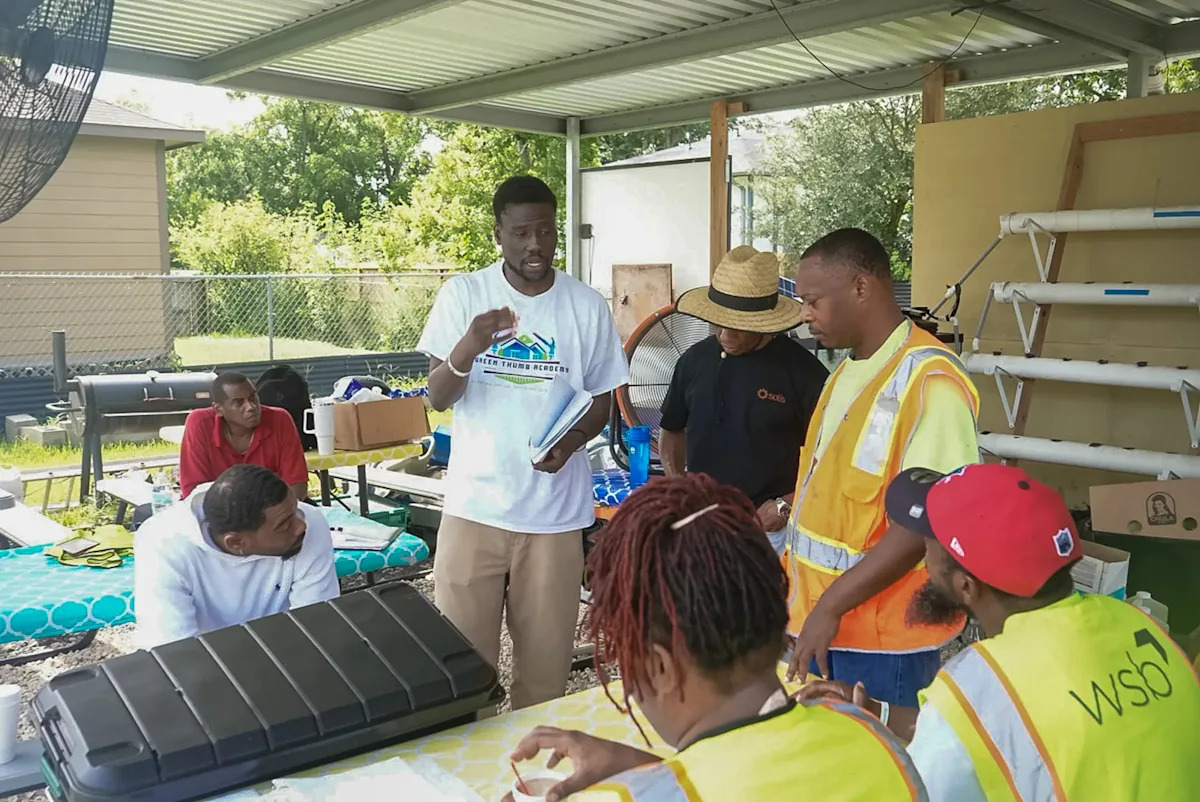The Texas Department of Criminal Justice reports that its recidivism rate is 16.9% — one of the lowest in the nation.
Part of that success comes from workforce programs like a new solar installation training designed for Black, low-income residents in Houston. Many individuals are formerly incarcerated and from neighborhoods historically affected by poverty and pollution.
Leon Dillard, who calls his hometown “the energy capital of the world,” spent two years in prison before his September 2024 release. According to Capital B News, he joined about 50 others this past summer in the 22-week solar training program led by the Black United Fund of Texas, the City of Houston, and Green Thumb Academy.
“It gave me a sense of purpose,” Dillard said. For the first time, he says he felt part of an educational program that offered support and life-changing benefits.
The program provided students with $18 an hour in wages, industry-recognized certification from the National Center for Construction Education and Research, a path to rebuild their lives, and a renewed sense of possibility — as the solar energy supports their community, according to the outlet.
Hazardous Waste And Its Toll On Houston’s Black Communities
For generations, Fifth Ward residents were unknowingly poisoned by coal tar — hazardous waste left behind by a nearby rail yard that seeped into the soil and filled the air. Over time, cancer clusters emerged, and today, life expectancy in the area is up to 20 years shorter than in Houston’s more affluent, predominantly white neighborhoods, according to Capital B News.
Dillard says the solar training program allowed him to help repair the damage and prevent future harm by doing work that generates cleaner environments for these communities.
“Being a part of [the program] felt like creating history,” he told Capital B. “Learning the trade with people from similar backgrounds [not only] gave us something to offer back to society, but also ourselves.”
In a converted Fifth Ward classroom, students spent most days working on both instruction and hands-on training. They studied electrical basics, Occupational Safety and Health Administration (OSHA) safety standards, solar installation mechanics, and how sunlight-generated electricity powered nearby homes. At other times, they climbed rooftops, hoisted panels, and wired mock homes.
Timesha Beattie of Green Thumb Academy opened each session by reminding trainees what certification could mean for their careers, their families, and the health of their communities.
“Once you earn these credentials, nobody can ever take them away. You are going to be able to take back to your families, the knowledge, the information, the credentials,” Beattie said, per Capital B.
When the five-month program concluded, students could install ceiling fans, identify wiring codes, and discuss the future of clean energy in Texas.
Trump Administration Cuts Threaten DEI Initiatives And Houston Solar Program
The program was partially funded by a $20 million grant from the Environmental Protection Agency (EPA) to the Black United Fund of Texas and the Houston Health Department. The grant was part of former President Joe Biden’s Inflation Reduction Act, a $2 billion initiative aimed at stimulating the economy through climate-focused infrastructure upgrades and addressing long-standing environmental injustices.
However, the funding soon came under threat as President Donald Trump pushed to eliminate “radical and wasteful” federal spending. As
™
previously told you, Trump signed an executive order on Jan. 20, 2025, his first day back in office, titled “Ending Radical And Wasteful Government DEI Programs And Preferencing,” banning federal agencies from engaging in diversity, equity, and inclusion programs.
On Feb. 5, U.S. Attorney General Pam Bondi issued a memo rescinding directives from the Biden administration that prioritized enforcing environmental laws in “overburdened and underserved communities.”
In May, Trump directed the EPA to cancel Biden’s grants, and later in August, his administration moved to eliminate $7 billion in solar funding for Black and low-income neighborhoods, Capital B notes. After the cuts were made public, about a quarter of the students chose not to participate in the Houston program.
With an annual budget of just $250,000, the Black United Fund pushed forward by combining other grants and resources to pay trainees’ wages.
“We’ve worked before without literal dollars,” CFO Velika Thomas said in February, Capital B reports. “It would be awesome to have the money, but we’re going to get through it somehow.”
Advocates note that community support — through donations and grassroots funding — can help sustain important climate programs when federal backing is lost. Capital B reports that donations and grants to the Black United Fund of Texas almost quadrupled between 2021 and 2023.
Texas Trails Only California In Solar Energy Growth
Health specialists estimate that a complete U.S. transition to clean energy through eliminating air pollution from energy-related activities could prevent over 50,000 premature deaths annually.
Texas currently ranks second in solar energy use, behind California, and employs the third most solar workers in the country. Still, lack of access to stable, large-scale federal funding limits the extent to which efforts like the Houston solar program can be successful.
To bring more clean energy to communities, experts say the government must reinstitute and expand public investment and create stronger policies that help small, local programs scale up.
For Thomas, the loss of federal funding underscored the critical need to invest in her own community.
“As a Black person, I have not felt that America has ever put us at the forefront,” Thomas told Capital B. “We are not a waste; the community is not a waste.”
The post How This Houston Solar Program Is Rebuilding Lives And Powering Historic Black Neighborhoods With Clean Energy appeared first on AfroTech.
The post How This Houston Solar Program Is Rebuilding Lives And Powering Historic Black Neighborhoods With Clean Energy appeared first on AfroTech.


